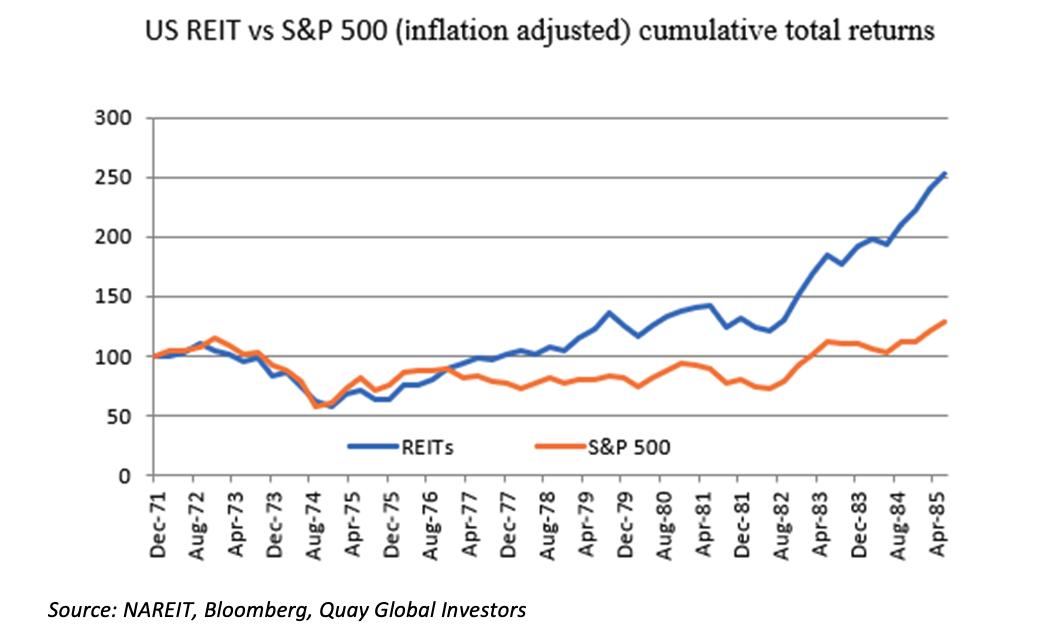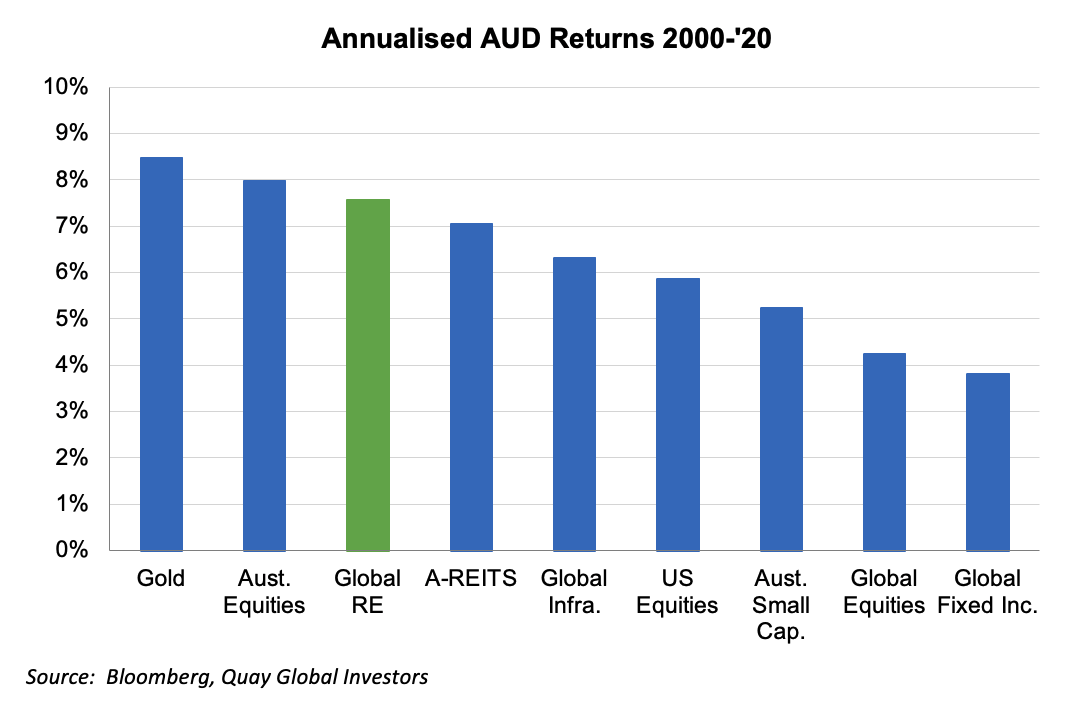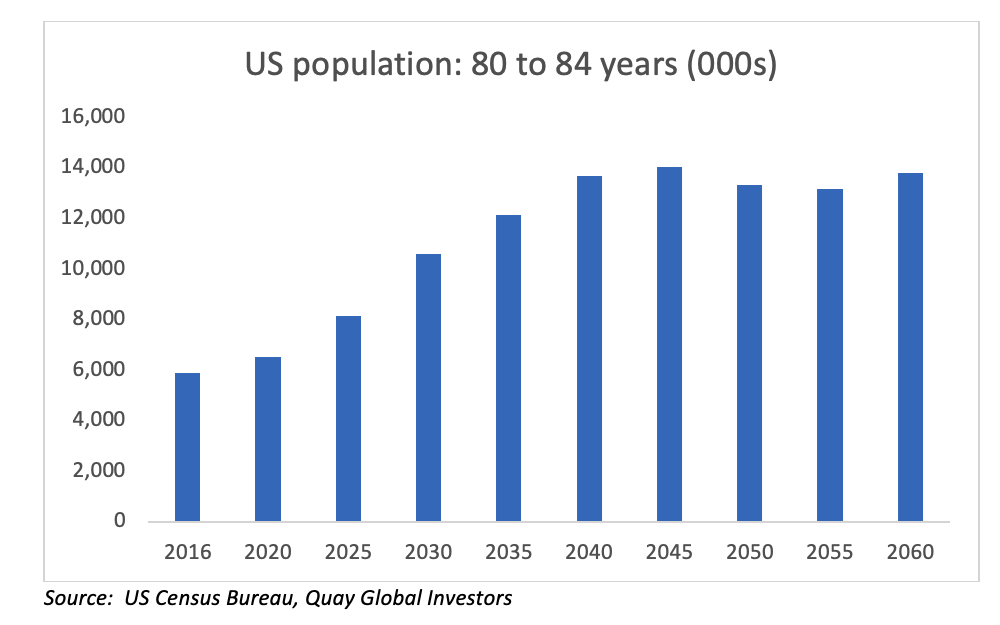Investable assets and a proven store of wealth
Houses, apartments and warehouses: we all know what they are, but once they cross into the investable universe we can lose sight of what makes them compelling (or not) in the first place. That’s one of the standout points made by Quay Global Investors’ Chris Bedingfield during a recent interview.
He cautions investors not to think about listed property as completely divorced from the direct property assets of which the asset class is comprised.
“It’s a long-term investment and a proven store of wealth. Don’t get caught up with the notion that listed property is more volatile – if the equity in your home was listed on the ASX it would be just as volatile as every other stock, yet that should not detract from its appeal,” Bedingfield says.
In the following interview, he reveals what’s currently keeping his team awake at night (and it’s definitely NOT interest rates or inflation). He also explains the role of listed property in individual portfolios, peeks into his crystal ball at what may lie ahead and reveals where he sees the best opportunities in the asset class.
How do low inflation and interest rates affect REITs?
Despite the headlines, over the long term interest rates have very little influence on real estate returns.
What drives most real estate returns are changes (increases) in replacement cost. In that context, low inflation generally leads to low long-term returns (as in Japan). High inflation accelerates the cost to build, which drives capital growth for existing property owners.
We see this in the data. For example, in the US between 1971-1985, when inflation regularly hit double digits, REITs delivered real total returns (after inflation) of more than 7% a year, significantly beating equities.

Where does listed property sit next to sectors such as financials; consumer goods; commodities?
Its very low rate of obsolescence is what distinguishes listed property. Compare that to other sectors and businesses that invariably “go broke” and are substituted or replaced by new businesses and industry. For example, BlackBerry was a leading business just 12 years ago but has since succumbed to the ravages of competitive capitalism. In contrast, well-located real estate such as houses or apartments will stay relevant for decades. Real estate, sensibly financed, is an attractive asset class for investors seeking to minimise the risk of permanent capital loss.
Are real assets in higher demand now than they were pre-COVID?
In some cases, yes. Demand for industrial (logistics) property is near insatiable. The surge in online retail during COVID and the associated risk to supply chains accelerated tenant demand for warehouse space and drove a corresponding increase in rents. Investors have followed with their capital, trying to take advantage of the theme.
At the other end of the spectrum, large-format shopping centres (among the worst affected sectors from the shutdowns) remain near friendless. This not only due to COVID, but also the ongoing fear that online retail will render most shopping centres obsolete (although we do not necessarily agree with this thesis).
What are the key differences between Australian REITs and global REITs?
There are a number of key differences.
- Global real estate is a more than $2 trillion investment opportunity, which is approximately 15 times larger than Australia’s REIT market.
- The local sector is dominated by a handful of assets classes such as retail, office and industrial property. Global real estate offers a significantly larger array of sectors – including single-family housing rental, self-storage, hospitals, senior housing, rental apartments and student accommodation.
- Interestingly, over the long term (20 years), the total returns from both sectors are similar at between 7 and 7.5% a year. For comparison, over the same timeframe, global equities returned around 4% a year.

Which parts of listed property do you expect will perform the strongest as the recovery continues?
In the near term (12 months), we expect operational performance will remain strong in industrial and self-storage sectors as the impact of COVID lingers. But we believe much of this is expected by the market and has largely been factored into current prices.
Over the longer term (more than five years), we expect very strong operating performance from sectors hit the hardest during COVID, including senior housing.
Senior housing (US/Canada) was disproportionately affected by COVID due to the vulnerability of residents (at 80+ years of age) and the inability of facilities to take on new residents. Not only will this sector perform well in the general recovery due to vaccinations, but by 2025 this key age demographic will increase by 25%, and a further 30% by 2030, driving tenant demand, rents and valuations.

What will be the biggest trends in listed property over the next couple of years?
The megatrend will be more capital moving offshore, seeking global real estate exposure as the local market becomes too small for our growing superannuation pool and investors look for diversification across different real estate asset classes.
We also expect larger superannuation funds will allocate less to direct property and more to listed property, as local opportunities become scarce and listed vehicles become the most effective way to access preferred sectors such as data storage or manufactured housing.
What’s one of your favourite holdings in your portfolio currently?
From an investment perspective, we think retail is interesting. We believe there are a number of tailwinds supporting our thesis that shopping centres should perform well over the next few years:
- Share prices remain depressed, even after recent gains from the ‘re-open trade’
- Investor expectations remain low due to the long-term threat of online retail
- Yet, good retailers are quickly learning that having a bricks-and-mortar strategy in combination with an online strategy is critical in delivering customer satisfaction and product margin
- For most retailers, while the number of physical stores will reduce, the remaining stores will be more strategically important and in most cases, larger – and retailers will pay for the best locations, and
- Significant government stimulus has re-capitalised household balance sheets, which will drive an increase in consumption (including retail) over the next two years. We’re already seeing this in the data in Australia.
In conclusion
In a time when so much has changed - how we live, work, shop and travel may never be the same even after the world gets vaccinated against COVID - it's easy to think everything has shifted. But a building is still a building. And as we've already seen, some "fleeting" changes become structural (seen Zoom's share price lately?) while other major shifts soon unwind (where did I put my LaserDisc?). The point is that despite claims to the contrary, offices aren't going to disappear and neither are shopping malls, as Bedingfield explains so clearly.
Investing in global listed real estate
Quay focuses on the preservation and creation of wealth through innovative strategies in real estate securities. For more insights on global property, visit Quay’s website.


